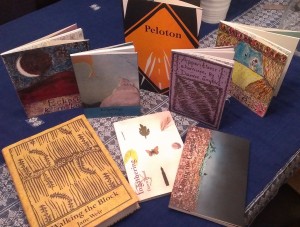Working for an American company I’ve spent a depressing amount of time 38,000 feet above the Atlantic, shuttling back and forth to New York and Boston. Regular travel can’t help but emphasize the increasingly global nature of many cultural disciplines: the same films and TV dramas are advertised in Times Square as in central London; successful novels can migrate across the Atlantic in both directions; subsets of theatre, dance, music and painting are engaged in a complex cross-timezone dialogue; architecture and fashion have long since become stateless global disciplines. The unfortunate exception is poetry. Continue reading
Category Archives: Reviews
Sasha Dugdale & Olivia McCannon at Woodstock
Last night I got to hear two of my favourite poets for the first time, reading alongside the excellent David Constantine at the Woodstock Poetry Festival. When you first hear someone whose work you really admire there’s always a nagging worry. What if they blurt out their lines like chopped up prose or chant them like Yeats at a séance? What if their delivery is rushed or broken or just plain bad?
In this case the what-ifs were unfounded. Continue reading
The Bounty of Derwent
I’ve spent much of the past two weeks happily immersed in a bag-full of books from the Derwent Poetry Festival (alternating with Richard Burton’s excellent biography of Basil Bunting, of which more in a future post).
(some of my Derwent purchases)
There’s so much good stuff here to enthuse about, but I can’t resist another opportunity to fly the flag for pamphlet publishing. Continue reading
Secular Magic: Polly Atkin
The back cover of Polly Atkin’s Shadow Dispatches lists eleven competitions she has variously won, placed in or been shortlisted for – and that’s not counting the Mslexia pamphlet competition in which Shadow Dispatches itself scooped first prize. In all, an impressive twelve awards referenced on one book cover. Although this isn’t a guarantee that the poems inside will be good (some of the poems that win competitions are wonderful; others are wonderfully well-adapted to winning competitions), it does raise serious expectations. And Atkin doesn’t disappoint. Continue reading
Living Myths: Jemma L King
In weaker moments it’s tempting to think of contemporary poetry in two unequal clusters: the dominant “poetry of anecdote” (praised in spite or because of its lack of magic) and the real thing. Jemma L King‘s debut collection is the real thing. Continue reading
Balance, intensity and complexity: Matthew Stewart
Wine is essentially indescribable. You don’t have to be a poet or qualified in the wine trade to realize this, but if you happen to be both then it’s unignorable. You can describe how a wine is made; you can (with training and practice) describe the structural and qualitative factors that distinguish one wine from another or allow it to command a particular price-point; you can explain how a wine makes you feel or the memories it evokes. But you can’t describe the thing itself. Continue reading
Future Remnants: Frances Leviston’s “Reconstruction”
Radio 4 introduced me to Frances Leviston’s work in early 2008. Over the course of a week The Today Programme were broadcasting a poem per day from each of the TS Eliot prize shortlist. After three lines of Leviston’s “I Resolve to Live Chastely” I’d resolved to buy her book. It was an extraordinary poem, and Public Dream was one of the poetic highlights of 2007/8 – a debut that could more than hold its own against a strong TS Eliot shortlist including Sean O’Brien’s The Drowned Book and Fiona Sampson’s Common Prayer. Later that year I met my wife for the first time; we both owned a copy of Public Dream and spent one of our earliest dinners together enthusing about how good it is. Continue reading
Making the Familiar Strange: Claire Trévien
It’s a rare joy to stumble across a poem by a new poet that’s so good you order their book straightaway. In this case the poem was “Whales” by Claire Trévien on Josephine Corcoran’s excellent blog And Other Poems. A few days later my copy of Trévien’s The Shipwrecked House arrived. It didn’t disappoint. Continue reading
The Story as it Must be Told: Meirion Jordan
I first encountered Meirion Jordan’s poems at a reading at the Troubadour in 2010. For reasons long since forgotten I was in a vile mood. The last thing I felt like was listening to poetry, but James Methven was reading as part of a Seren line-up and I’d promised to go along for moral support.
It turned out to be one of the best poetry readings I can remember. Continue reading
Poetry & the Art of Editing: Poetry Review 103:2
Magazines (or Periodicals if you’re feeling frisky) are the cardio-vascular system of contemporary poetry. Open any recent collection and you’ll find something like: “Acknowledgements are due to the editors of the following publications in which some of these poems first appeared”, then a list of magazine titles that either follow the Ronseal / exactly-what-it-says-on-the-tin principle (Poetry; Poetry Review; Poetry Wales) or its near opposite (Magma; Archipelago; The North). Continue reading

